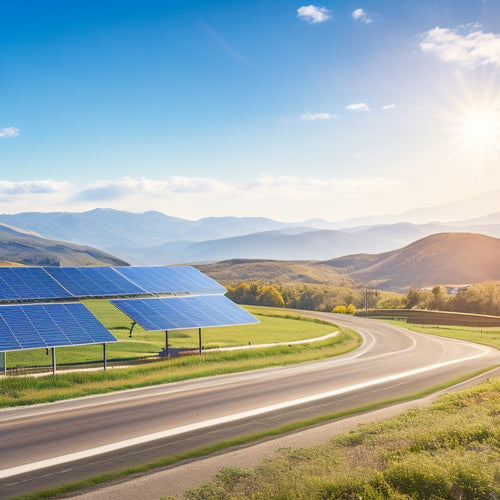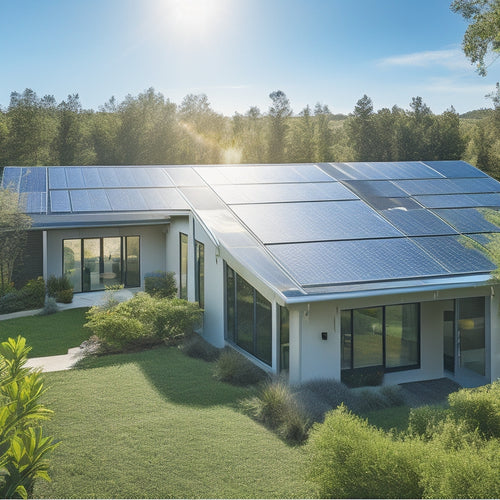
Unlocking Home Energy Freedom: Why Go Off-Grid?
Share
You're taking a significant step towards energy independence by considering an off-grid lifestyle, where renewable energy sources and efficient design converge to minimize your reliance on traditional grids and municipal services. By embracing renewable energy sources like solar, wind, and geothermal, you can reduce your carbon footprint and energy costs. Energy-efficient home design and optimized solar power systems further enhance your energy autonomy. Additionally, energy storage solutions and off-grid water conservation strategies guarantee a stable and sustainable living environment. As you investigate the benefits of off-grid living, you'll reveal how to release home energy freedom and create a more sustainable future for yourself.
Overview
- Off-grid living reduces reliance on traditional energy grids and municipal services, promoting self-sufficiency and independence.
- Renewable energy sources like solar, wind, and biomass power provide clean energy, reducing carbon emissions and environmental degradation.
- Energy-efficient home design and smart technologies optimize energy production and consumption, minimizing waste and costs.
- Off-grid systems can provide backup power during grid outages, ensuring energy stability and security.
- By harnessing natural resources, off-grid living fosters a sense of freedom and autonomy, while promoting sustainable lifestyle choices.
Embracing Renewable Energy Sources
As you shift away from reliance on the grid, embracing renewable energy sources becomes an essential step towards achieving off-grid energy freedom.
You'll want to take into account a mix of wind energy, biomass power, and geothermal heating to diversify your energy portfolio. Hydroelectric systems can also provide a dependable source of power, especially if you're near a water source.
By opting for high-efficiency solar panels off-grid solar power systems, you can maximize energy production and reduce installation costs. Community solar programs can be a great option if you can't install solar panels on your property.
By leveraging these renewable energy sources, you'll reduce your carbon footprint and increase your energy independence. Plus, many governments offer renewable incentives to encourage sustainable living and eco-friendly practices.
Energy Efficient Home Design
You've made considerable progress in reducing your reliance on the grid by embracing renewable energy sources, such as Solar Energy Solutions.
Now, it's time to optimize your home's design for maximum energy efficiency, incorporating sustainable insulation options like recycled denim or natural wool. A well-designed off-grid home incorporates passive solar principles, thermal insulation, and natural ventilation to minimize heating and cooling needs.
Conduct an energy auditing to identify areas for improvement. Choose sustainable materials and consider green roofing options that provide additional insulation.
Daylight harvesting techniques can reduce the need for artificial lighting, while air sealing guarantees heated or cooled air isn't wasted. Install efficient lighting and smart thermostats to fine-tune your energy usage.
Solar Power System Essentials
You'll need to understand the core components of a solar power system, including the panels, mounting systems, and wiring, to guarantee a reliable and efficient energy supply.
When selecting a system, think about high-efficiency solar charging solutions that maximize energy harvest and employ advanced MPPT technology for peak energy capture.
Next, you'll need to reflect on energy storage solutions, such as batteries, to store excess energy generated during the day for use during the night or on cloudy days.
System Components Overview
Your solar power system's backbone consists of several critical components, each playing an essential role in utilizing and converting sunlight into usable electricity.
These components work together to provide energy autonomy, allowing you to live off the grid. The solar panels, mounted on your roof or in a solar array, capture sun energy. An inverter converts DC power into AC, making it usable in your home. A mounting system securely fastens the panels, while a monitoring system tracks performance.
Depending on your needs, you may also integrate wind energy, biomass energy, or other eco-friendly technologies into your microgrid system.
With a well-designed system, you'll enjoy energy independence, grid resilience, and sustainable living.
Energy Storage Solutions
As the sun sets or during periods of low solar radiation, energy storage solutions become essential to maintaining a consistent power supply in your off-grid setup.
You'll need a reliable way to store excess energy generated during the day for use at night or on cloudy days. This is where batteries come in.
Effective battery management is critical to guaranteeing your energy independence. You'll want to evaluate factors like battery type, capacity, and depth of discharge to guarantee your system operates efficiently.
A well-designed energy storage solution will provide you with a stable power supply, even when the grid is down.
Inverter Technology Options
The heart of any solar power system is the inverter, which converts DC power from the solar panels into usable AC power for your off-grid home. When choosing an inverter, you'll need to decide between grid-tied and off-grid options. Grid-tied inverters synchronize with the grid, allowing you to sell excess energy back to the utility company. Off-grid inverters, on the other hand, are designed for standalone systems and provide energy independence.
Here's a comparison of popular inverter technologies:
| Inverter Type | Efficiency | Cost | Synchronization |
|---|---|---|---|
| String Inverters | 95-98% | Low | Grid-tied |
| Microinverters | 95-98% | High | Grid-tied |
| Off-Grid Inverters | 90-95% | Medium | Standalone |
| Hybrid Inverters | 90-95% | High | Both |
When selecting an inverter, consider your energy needs, budget, and desired level of grid independence. Look for high inverter efficiency to minimize energy losses and maximize your energy freedom.
Battery Storage Solutions
As you design your off-grid energy system, you'll need to evaluate battery storage solutions that provide energy backup during periods of low sunlight or grid outages.
You'll want to integrate these solutions with your renewable power sources to guarantee a seamless flow of energy.
Energy Backup Systems
Configure your off-grid energy system with a reliable energy backup plan, and you'll never be left in the dark. Energy backup systems are essential for ensuring energy independence and sustainable living. They provide a safety net during power outages, grid failures, or when your renewable energy sources aren't generating enough power.
| Backup System Type | Pros | Cons |
|---|---|---|
| Lead-Acid Batteries | Affordable, widely available | Heavy, limited lifespan |
| Lithium-Ion Batteries | High energy density, long lifespan | Expensive, sensitive to temperature |
| Flow Batteries | Scalable, long-duration energy storage | Large footprint, high upfront cost |
| Flywheel Energy Storage | High power density, low maintenance | High upfront cost, limited scalability |
| Diesel Generators | Reliable, high power output | Noisy, polluting, high maintenance |
Renewable Power Integration
You're taking an essential step towards off-grid energy freedom by integrating renewable power into your system.
Renewable power integration involves combining multiple sources, such as wind energy, geothermal heating, and hydropower systems, to guarantee a reliable energy supply.
By incorporating biomass utilization and microgrid technology, you can optimize your energy production and reduce reliance on the grid.
This integration enables you to store excess energy in battery storage solutions, providing backup power during outages or periods of low energy production.
With renewable power integration, you're one step closer to achieving energy independence and releasing true off-grid energy freedom.
Off-Grid Water Conservation
Twenty gallons of water per day is the average American's usage, but off-grid homesteaders typically aim for a fraction of that.
You'll want to adopt water-saving strategies to minimize your reliance on municipal supplies. Rainwater harvesting and greywater recycling can greatly reduce your water footprint.
Implement drought-resistant landscaping and efficient irrigation systems to minimize water waste. Invest in conservation technologies like water-saving fixtures and sustainable plumbing to optimize your water usage.
By adopting permaculture practices and watershed management principles, you'll not only conserve water but also recharge your local aquifer.
Net Zero Energy Homes
With the water independence box checked, it's time to tackle the next essential aspect of off-grid living: energy independence.
You're likely considering a net zero energy home, which produces as much energy as it consumes. This is achieved through sustainable design, incorporating features like insulation, passive solar design, and renewable energy systems like solar or wind power.
By generating your own energy, you'll reduce your reliance on the grid and enjoy lower utility bills.
Net zero energy homes not only provide energy independence but also minimize your carbon footprint.
As you investigate off-grid living, a net zero energy home is a significant step towards achieving true energy independence and freedom.
Frequently Asked Questions
Can I Still Use My Existing Electrical Appliances Off-Grid?
You can still use your existing electrical appliances off-grid, but you'll need to verify solar appliance compatibility and consider energy-efficient upgrades to minimize energy consumption and optimize your off-grid system's performance.
How Do I Handle Energy Usage During Extended Periods of Low Sunlight?
During extended low-sunlight periods, you'll rely on solar battery storage to power your home, so it's essential to optimize energy usage through efficient practices like reducing load, using power-hungry appliances strategically, and optimizing your system's performance.
Are Off-Grid Homes More Prone to Power Outages and Blackouts?
You're probably thinking off-grid homes are blackout magnets, but surprisingly, they're not! With resilience strategies and power redundancy in place, you'll be less likely to experience outages, and when you do, you'll bounce back faster than the grid can say "brownout".
Can I Connect to the Grid if I Need Extra Energy?
You can connect to the grid if you need extra energy, but it may compromise your energy independence; however, with a grid connection, you can supplement your off-grid system and maintain freedom from relying solely on the grid.
Do Off-Grid Homes Require More Maintenance Than Traditional Homes?
You'll face unique maintenance challenges with off-grid systems, requiring more frequent checks on energy storage, generators, and renewable sources, but with a proactive approach, you'll guarantee your independence and self-sufficiency aren't compromised.
Ready to Buy
As you consider unfastening home energy freedom, you're not just cutting ties with the grid - you're investing in a sustainable future. With renewable energy sources, efficient design, and smart storage solutions, you're taking control of your energy needs. But the question remains: what's stopping you from breaking free from the grid's constraints and embracing true energy independence?
Related Posts
-

Smart Home Thermostats to Revolutionize Your Space
Smart home thermostats revolutionize your space by providing precise temperature control and optimizing energy saving...
-

Is Switching to Green Energy Solutions Easy
Switching to green energy solutions isn't just easy; it's also beneficial. You can greatly cut utility costs and enjo...
-

Installing Metal Solar Roofs for Maximum Energy Efficiency
Installing metal solar roofs can drastically enhance your home's energy efficiency and durability. These roofs withst...


